W hen I tell stories about my father from the old days, one of the most popular is about the time I broke a milk bottle in the sink and decided to stick my hand in to pull out the glass. Standing in the kitchen with my bloody hand wrapped in a dish towel, I listened to my father give a lengthy explanation of the downside of that decision. Then he took me to the hospital for stitches.
That’s what I usually remember.
Fast-forward to last week, when I was teaching my son to drive. I offered instruction and patient advice, never flinched or yelled, calmly pointed out traffic rules and driver courtesies, and overall was a perfect driving instructor. While I congratulated myself later, he brought up my limited patience when behind someone driving under the speed limit.
“Seriously?” I said to my husband in private. “I have one flaw, and that’s his takeaway? After years of modeling kindness, empathy, compassion, integrity—after trying to teach all of those values, what he remembers is that slow drivers tick me off?”
My husband, still processing the “one flaw” part, said, “I don’t think so. I think the other stuff is more subtle. But that doesn’t mean it’s not there.”
Later that same week, as we were waiting to board a bus for college visits in New York City, my son noticed a toddler leaving the bus completely unattended. He saw the danger, dropped his bags and ran over to the boy before he could run into traffic—or worse. Suddenly a relative emerged from the bus and claimed him.
In the moment it took for that entire event to transpire, I couldn’t have been prouder of him. And I realized my husband was right: My son might remember my flaws, but it doesn’t matter, because he is living our values.
That brought me to my father, and sticking my hand in the sink. As I thought more about growing up around him, I realized all that he had shown me about kindness, empathy, compassion and integrity, simply by living those values regardless of what life threw his way.
I thought about when my uncle became ill with the AIDS virus, at a time when coming out of the closet carried the risk of rejection and outright danger, and my father invited him into our home to care for him. I thought about when my brother, in his 30s, told my parents he was gay, and my dad’s reaction was sadness that he had been afraid to tell them for so long. I realized that I had never once heard my father—who does not suffer fools quietly—utter a disparaging word about another human being’s race, gender, religion or sexual orientation.
My dad taught me how to live an authentic life, flaws and all, and it occurs to me that neither of us has ever stopped to consider that impact. He wouldn’t because he’s too humble, and I wouldn’t because I’m too self-centered. But intentionally or not, he has shared with me all of the qualities I’ve hoped to instill in my own children.
So when we shared the same type of cancer recently, I wasn’t even afraid.
My dad had thyroid cancer several years ago. His thyroid was removed, he was treated with radioactive iodine, and he was fine for a long time. Last year it returned in his lungs; while he was preparing to undergo his second treatment, I was diagnosed with it. My thyroid gland and surrounding lymph nodes were removed the day he had his radioactive treatment, and my treatment followed after that.
We talked to each other on the phone almost daily to check in and, in my case, get confirmation about side effects and how to manage them. Once again he created a path for me to follow as he has done since the day I was born.
I am only now seeing how much the unspoken lessons of our parents affect who we are, and how those lessons then affect how we behave around our own children. I may remember the milk bottle and the kitchen, just as my son might remember the slow drivers, but I’m hopeful that my dad knows the lessons have not been lost.
His grandchildren are living them.



